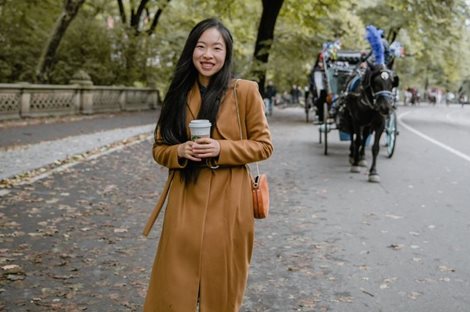April 29, 2019
 Chuxin Liu is a third-year doctoral student in economics at The Graduate Center, where she is also a Stone Center research assistant. She came to New York from Guangzhou, a city near Hong Kong, and is currently focusing her research on development economics and urban economics.
Chuxin Liu is a third-year doctoral student in economics at The Graduate Center, where she is also a Stone Center research assistant. She came to New York from Guangzhou, a city near Hong Kong, and is currently focusing her research on development economics and urban economics.
Liu recently spoke to us about moving to the city at the age of 22, why she enjoys the challenges of teaching, and how her experiences among the children of wealthy families at Peking University sparked her interest in socioeconomic inequality.
What drew you to the study of inequality?
There were two different experiences that are related. One was my college experience, when I started to feel that there weren’t many students from less wealthy families getting into Peking University. We always think that education is a ladder to get up, but it seems like this ladder is occupied by the wealthier group, the high income earners. So that’s not exactly only an issue of inequality; this is about social mobility.
Another experience was my field project in college. They sent us to do micro-data survey collection of 200 families. I spent about a month just knocking on peoples’ doors and convincing them to take a household survey for us.
We went to four counties and five villages. I couldn’t believe what I saw in those villages. People were still engaged in brutal farming activities, and their kids were not being taken care of in a way that would give them good opportunities in the future.
They didn’t have access to schools?
They had access, but the education quality is not very good; it’s completely different from my experience growing up in a big city. It made me interested in why some people get so many chances and resources, but others do not.
You came to The Graduate Center straight from Peking University. Was it hard to move to New York on your own, at the age of 22?
It was hard at the beginning — culture-wise and language-wise. New York City is probably the most diverse place I’ve ever been. The diversity has brought me a lot of new experiences, and let me see how different people are chasing different dreams and different career paths.
Diversity is one of the best things about The Graduate Center. It’s not a place where you can easily stay in your comfort zone and say, “Okay, I’m just going to hang out with my Chinese friends and only speak Chinese.” It’s a place where you have to communicate with international and native students.
And you’re also communicating with undergraduates.
This semester, I’m teaching the Introduction to Econometrics class at Baruch College. I really enjoy teaching. The examples in textbooks are a few years old, so I like to bring out research that was done maybe two months ago. I’ll see something and say, “This is really interesting. I want to share it with my students, and see how they think about this.” So I bring up questions and examples and let them have a discussion, and that’s my favorite part. It might not be the most technical part, but I think economics, in the end, is about using techniques to explain very intuitive questions. So going through the intuitive part with undergraduate students is very interesting to me, and it’s very rewarding when they’re learning.
Teaching also pushes me to learn new things. I always set up goals about teaching something that I’m not a complete expert in, so that I’ll have to push myself. I need to become an expert before I stand in front of them. That’s turned out to be very effective.
What do you do during your downtime?
I like running, and I’ve found some running friends in the city. I ran the New York City marathon last year, and also picked up trail running. Everything happens very naturally when you know some running friends.
With graduate study, you can easily spend your whole day just sitting by yourself. And that’s not very healthy. It’s important to relax, and also to have some friends.


